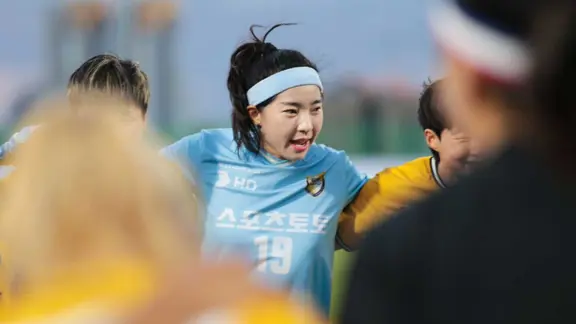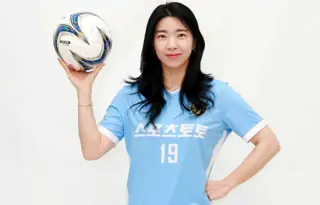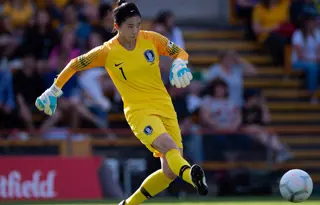Player Story
Ga-Ae Kang: "If we want change, we have to speak up"

Ga-Ae Kang is the winner of the 2024 Player Voice Award, one of the three FIFPRO Merit Awards. The Sejong Sports Toto WFC goalkeeper and former Korea Republic national team player is the main driver in the quest to improve the women’s game and players' working conditions in her country.
By Ga-Ae Kang
My twin sister Na-Ru and I started playing football in 2002 after the World Cup in Korea and Japan. Our younger brother was already playing football. I ended up being a goalkeeper, although I started as a forward.
Initially Na-Ru was the goalkeeper because she is a little bit taller. However, she got scared of the balls coming her way, so I took her place as I was the second tallest in our team. My sister became a striker and played professionally for a year until she had to retire due to a knee injury.
At that time, it was a bit unusual for girls to play football. My parents were also not happy. "What kind of girl plays football?”, they would ask. There was this social prejudice in Korea, that women were not good enough to play football. But I persuaded my parents to let me join a youth team because it was fun and I wanted to play.
In Korea, you can only develop as a player in middle school, high school or university. Where we lived, there were no schools with a girls’ team where I could develop, so I had to look elsewhere in bigger cities in the Gyeonggi province and the metropolitan area of Seoul. And even there, they were struggling.
Most of my team-mates took football very seriously, but we had problems completing the squad. The team needed to add student athletes who just wanted to kick a ball. It was not a real professional environment.
I struggled in the beginning, thinking I couldn’t become a professional, but this time my parents convinced me to continue playing. They said I had to take the responsibility for my choices and that was a boost for me to keep going. I once again found the joy in playing; I wanted to do it more and more, I became better and better, and that kept me going.

The Women’s K-League has a draft system and if you are not drafted by a team, then you basically have no chance of playing professional football. Only half of the players get drafted, so for a long time I was simply happy that I was able to be a professional footballer after getting selected. I accepted the conditions as they were, as well as the treatment we received.
When I became a professional player in 2011, the wage limit had just increased, but it has not changed in the 13 years since. Our team didn’t have a training pitch, so we had to find a playground or rent a field at a university. And I am not talking about football pitches – these were just grounds with sand or so. The accommodation arranged by our club was also nothing more than a dormitory at a university.
When I got older and connected with the Korean Professional Footballers Association (KPFA), I started noticing these issues and many others. For example, there is a huge problem with the recruitment of young players, as several middle school, high school and college teams disappeared. It is a crisis for us in Korea because it is the only way that girls are being developed. That is also how I learned to play.
The salary cap is damaging our sport. It is already difficult to become a professional footballer and with the current salary cap being so low, parents don't see a future for their children in women's football and push their girls to other sports such as baseball and basketball where they can earn more money. That is why we want this salary cap to be abolished and we are almost there.
Our game must be more visible and attract more spectators. In the end, this will make our sport more professional
To be honest, at first, I was a bit shocked that I had not been aware of all these issues before in my career. But after I had realised this, I started making plans to change things. To better understand the issues for women’s football in Korea, I reached out to players competing abroad and asked them about their experiences: how are players in other countries treated, and how do leagues operate with respect to the players? Through these conversations, I identified the key issues alongside players in the WK League.
I plan to leverage the strength of the KPFA to address these challenges effectively. I have been able to help make other players more aware and change their perception of women's football. As a vice president of the KPFA, I visited clubs and helped increase membership to 185 women's players. We also established a women's football committee that meets every month to discuss how to improve our working conditions.
As players, we have to speak up if we want to change our conditions and treatment. It is not easy, as in the past players were sanctioned for raising their voice. But if we stop out of fear, then no one else will be thinking about the future of Korean football, and then nothing will change. A clear example of the power of our voice was illustrated this summer when we managed to adjust kick-off times to prevent playing in extreme heat.

We are trying to make our sport more popular; to me it is heart-breaking that women's football is being labelled unpopular while the men's game is so strong in our country. That's why we have launched various initiatives to improve the status of the WK League. Our game must be more visible and attract more spectators. In the end, this will make our sport more professional.
I will be retiring after this season ends. I have been postponing it for two years now because I first wanted to pass my knowledge as much as possible to the next generation, hoping to contribute to the development of our game. I hope that me winning this award will influence other players to do something similar to advance our game.
